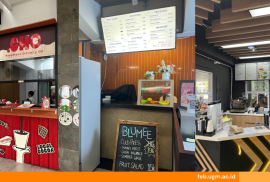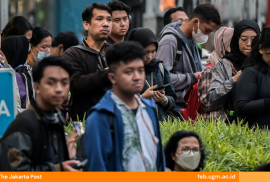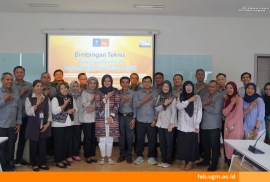The rapid development of technology in the 4.0 industrial revolution era has led to the emergence of various new technologies, one of which is Blockchain. Responding to these developments, on Friday (7/2/2021) the Management Department of the Faculty of Economics and Business Universitas Gadjah Mada (FEB UGM) held the 5th Management Forum Webinar with the topic of “Blockchain Technology for Business: A New Industrial Revolution?”. This webinar was held via the Zoom Platform and moderated by Rocky Adiguna, Ph.D, Lecturer of the Management Department FEB UGM.
Attended by Students, Lecturers, Researchers and Practitioners, this webinar raised the topic of blockchain and presented by speakers Nofie Iman, Ph.D., Eddy Junarsin, Ph.D., and Rangga Almahendra Ph.D. which are a Lecturers of the Management Department, Faculty of Economics and Business UGM.
The first session was an explanation of the meaning and history of blockchain by Rangga Almahendra, Ph.D. Rangga said that we are currently in the Industrial Revolution 4.0 where everything is connected to the internet. This has a positive impact, but also raises a series of problems, where there are problems of trust, security and authenticity. For that, according to him, there needs to be an intermediary to solve the problem. However, according to Rangga intermediary, it also adds a new problem.
“Our data is taken and our behavior is studied, so if you are not paying the product, then you are the product,” said Rangga.
Rangga argues that there is a need for data democratization, where individuals can control their own data, transactions, and assets. It is can be realized through Blockchain, in which there is a technology that eliminates third parties in transactions. Regarding Blockchain, he said that a familiar application is in cryptocurrency, one of which is Bitcoin. Rangga argues that because in Indonesia it cannot be used as payment, Bitcoin is classified as a Crypto Asset.
“We in Indonesia use the Rupiah currency, for that it is more appropriate if Bitcoin is said to be a commodity (Crypto Asset), not a currency,” said Rangga.
Another Blockchain implementation, Rangga provides an overview of creating a distributed ledger of transactions. The ledger of transactions stored in a distributed blockchain can be accessed openly to ensure accountability, so it cannot be manipulated and intervened by certain authorities. Another application is in digital signatures, blockchain is implemented using cryptography that uses data encryption and description.
The next session was a presentation from Nofie Iman, Ph.D. regarding Blockchain and Distributed Ledger Technology. Nofie explained that the ledger function is used as a distributed record, it is difficult to change, but on the other hand it is available to all stakeholders.
“It’s easy and convenient to access anytime, anywhere,” said Nofie.
Nofie said that this distributed ledger became very popular because previously we were fixated on something that was centralized, and could only be accessed by certain people, thus requiring an independent party as a mediator. The existence of the economic crisis caused a crisis of confidence in banks so that the idea of a distributed ledger was arise again.
“What if the intermediary party cannot be trusted or fails to carry out their duties? That is why a distributed ledger using blockchain appears”.
Distributed ledgers are attractive because they are anonymous, use a shared consensus, are limited, are permanent, have time stamps and records, and are very secure. Nofie said this technology can be made a system that is difficult to change, and reliable without a third party. There are two types of blockchain applications in the business and organizational sector, the first is smart contracts and the second is Decentralized Autonomous Organization (DAO).
“What if blockchain is not just about transactions, but inserts different rules, programs, and data that make blockchain useful. Blockchain applications as smart contracts, for example in futures contracts, transaction agreements can be placed on the blockchain so that the blockchain can execute them automatically,” said Nofie.
While in the Decentralized Autonomous Organization, Nofie said that the application was determined using rules. For example, for donor transplant management, the data is confidential, so data is collected through the application using a matching algorithm so as to provide suitable patients for transplantation.
“Not just a currency, blockchain can be used in many ways using smart contracts and DAOs in government, education, health, and will create great and global potential,” concluded Nofie.
The last session was an explanation of blockchain technology by Eddy Junarsin, Ph.D. Eddy explained that blockchain has several advantages including a secure platform, creating a better contributive economy, and preventing payment scams.
“Blockchain enables digital certification and certification of ownership of intellectual property, providing a trusted and transparent platform for suppliers and buyers to trade without the involvement of third parties, and prevents payment scams, because every transaction that occurs has a digital signature,” said Eddy.
In addition, according to Eddy, financial service applications based on Blockchain technology can accommodate cross-border transactions which allow cross-border transaction processing to be faster and cheaper. In addition, the Point of Sales system through Blockchain technology can allow merchants to accept cryptocurrency as payment, eliminating expensive card transaction fees and assisting in cash management.
Reportage : Sony Budiarso/Kirana Lalita Pristy
Video : https://youtu.be/PSnR-wY-YhI




